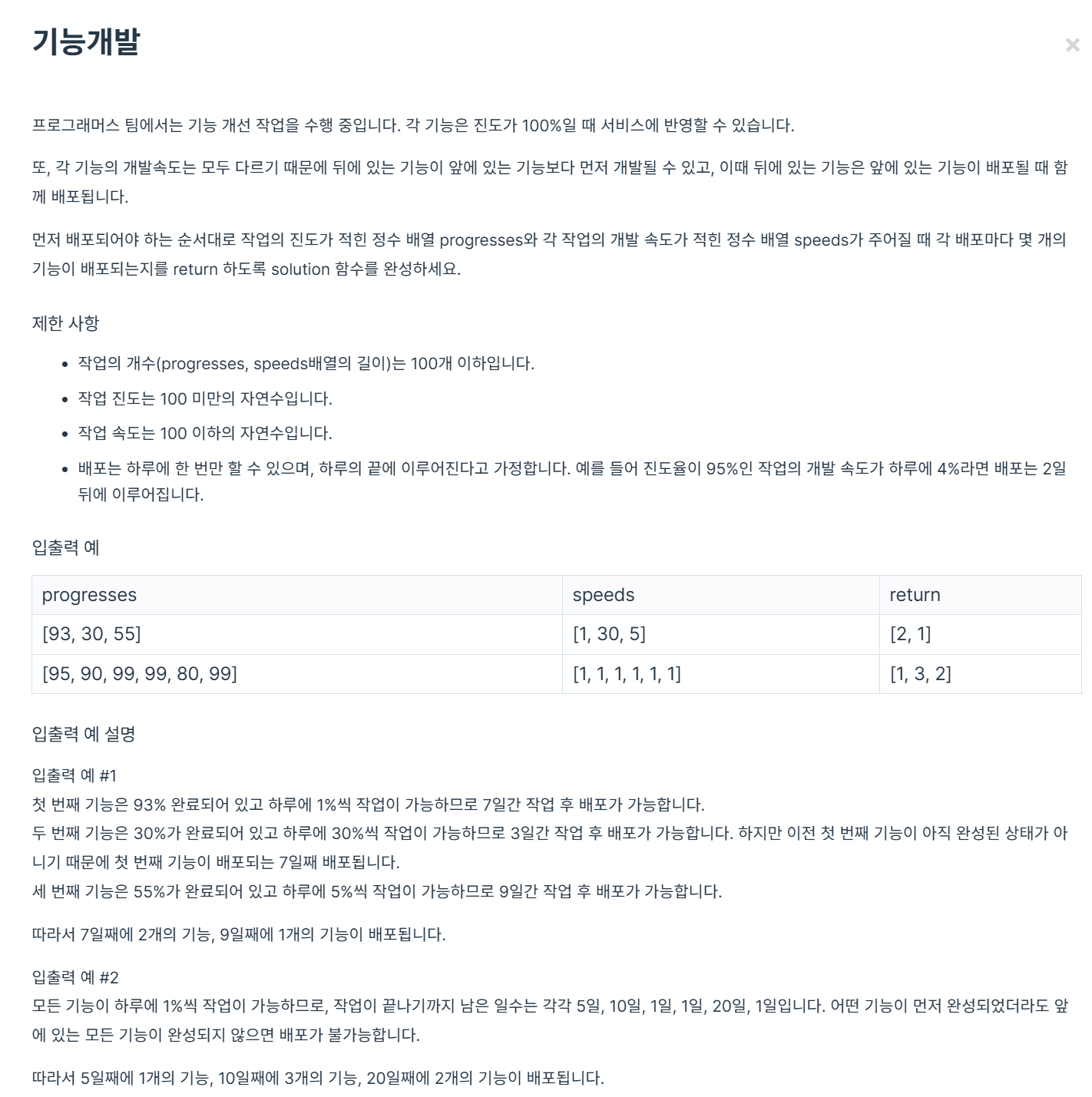
✏️ Solution 1
import java.util.Arrays;
import java.util.LinkedHashMap;
import java.util.LinkedList;
import java.util.Map;
import java.util.Queue;
public class 기능개발 {
public int[] solution(int[] progresses, int[] speeds) {
Queue<Integer> q = new LinkedList<>();
Map<Integer,Integer> map = new LinkedHashMap<>();
for (int i=0; i<progresses.length; i++) {
q.add(progresses[i]);
}
System.out.println(q);
int n = 1;
for (int i=0; i<progresses.length; i++) {
while (true) {
if (progresses[i] + speeds[i]*n >= 100) {
q.poll();
map.put(n, map.getOrDefault(n, 0)+1);
System.out.printf("q: %s, map: %s \n", q, map);
break;
} else {
n++;
}
}
}
System.out.println(map.values());
return map.values().stream().mapToInt(Integer::intValue).toArray();
}
public static void main(String[] args) {
기능개발 s = new 기능개발();
System.out.println(Arrays.toString(s.solution(new int[] {93, 30, 55}, new int[] {1, 30, 5})));
System.out.println();
System.out.println(Arrays.toString(s.solution(new int[] {95, 90, 99, 99, 80, 99}, new int[] {1, 1, 1, 1, 1, 1})));
}
}
Map<Integer,Integer> map = new LinkedHashMap<>();
map : n일째에 몇개 배포되었는지 담는다
map.values().stream().mapToInt(Integer::intValue).toArray()
Map의 값들을 int 배열로 바꾸는 코드
map.values()
Map에서 값들만(Collection) 가져온다
Map<Integer, Integer> map = Map.of(1, 3, 2, 5);
map.values(); // [3, 5]
.stream()
Collection을 Stream으로 바꾼다
Stream을 쓰면 반복/필터링/변환 등을 함수형 스타일로 작성 가능하다
.mapToInt(Integer::intValue)
Stream<Integer>를 IntStream으로 변환한다
Integer::intValue
Integer 객체 → int 값으로 변환하는 메서드 참조 ⬇️
Integer i = 5;
int j = i.intValue(); // 언박싱
.toArray()
IntStream을 int[] 배열로 변환한다
출력결과
[93, 30, 55]
q: [30, 55], map: {7=1}
q: [55], map: {7=2}
q: [], map: {7=2, 9=1}
[2, 1]
[2, 1]
[95, 90, 99, 99, 80, 99]
q: [90, 99, 99, 80, 99], map: {5=1}
q: [99, 99, 80, 99], map: {5=1, 10=1}
q: [99, 80, 99], map: {5=1, 10=2}
q: [80, 99], map: {5=1, 10=3}
q: [99], map: {5=1, 10=3, 20=1}
q: [], map: {5=1, 10=3, 20=2}
[1, 3, 2]
[1, 3, 2]
✏️ Solution 2
import java.util.ArrayList;
import java.util.Arrays;
import java.util.List;
public class 기능개발_2 {
public int[] solution(int[] progresses, int[] speeds) {
List<Integer> result = new ArrayList<>();
int n = progresses.length;
int[] days = new int[n];
// 각 작업마다 걸리는 날짜 계산
for (int i=0; i<n; i++) {
days[i] = (int) Math.ceil( (100.0-progresses[i]) / speeds[i]);
}
System.out.println("각 작업마다 걸리는 날짜: " + Arrays.toString(days));
// 앞에 있는 작업보다 늦게 끝나면 따로 배포, 아니면 같은 날 배포
int cnt = 1;
int prev = days[0];
for (int i=1; i<n; i++) {
if (days[i] <= prev) {
cnt++;
} else {
result.add(cnt);
cnt = 1;
prev = days[i];
}
System.out.printf("prev: %s, cnt: %d, result: %s \n", prev, cnt, result);
}
result.add(cnt);
System.out.println(result);
return result.stream().mapToInt(Integer::intValue).toArray();
}
public static void main(String[] args) {
기능개발_2 s = new 기능개발_2();
System.out.println(Arrays.toString(s.solution(new int[] {93, 30, 55}, new int[] {1, 30, 5})));
System.out.println();
System.out.println(Arrays.toString(s.solution(new int[] {95, 90, 99, 99, 80, 99}, new int[] {1, 1, 1, 1, 1, 1})));
}
}
- 각 기능이 며칠 뒤에 배포 가능한지 계산
- 앞 기능이 완료될 때 같이 배포될 수 있는 뒷 기능들을 묶는다
prev : 현재 배포 기준 날짜
days[i] <= prev : 같이 배포 가능하다면 cnt++
더 늦게 끝나는 작업이 있다면 => 지금까지 모은 cnt를 result에 저장하고 새 그룹 시작
출력 결과
각 작업마다 걸리는 날짜: [7, 3, 9]
prev: 7, cnt: 2, result: []
prev: 9, cnt: 1, result: [2]
[2, 1]
[2, 1]
각 작업마다 걸리는 날짜: [5, 10, 1, 1, 20, 1]
prev: 10, cnt: 1, result: [1]
prev: 10, cnt: 2, result: [1]
prev: 10, cnt: 3, result: [1]
prev: 20, cnt: 1, result: [1, 3]
prev: 20, cnt: 2, result: [1, 3]
[1, 3, 2]
[1, 3, 2]
Solution1 의 시간 복잡도는 거의 O(n^2) 이다
Queue와 Map을 함께 사용 → 메모리 사용이 약간 많다
이전 작업이 완료될 때까지 n을 증가시키는 while루프는 비효율적일 수 있다
Solution2 의 시간 복잡도는 O(n)
List<Integer> 하나만 사용 → 더 효율적이다
꼭 Queue 자료구조가 아니더라도 해결 가능하다.
'IT > Algorithm | Coding Test' 카테고리의 다른 글
| [프로그래머스 64065] [Java] 튜플 (0) | 2025.04.15 |
|---|---|
| [프로그래머스 12914] [Java] 멀리뛰기 (2) | 2025.03.17 |
| HashMap (0) | 2025.03.17 |
| [프로그래머스 138476] [Java] 귤 고르기 (2) | 2025.03.17 |
| [프로그래머스 12945] [Java] 피보나치 수 (0) | 2025.03.11 |